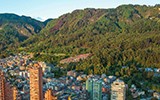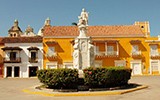What makes Colombia unique is that it is one of the most diverse countries in the world, bordered by two oceans and with ...
Living in Colombia guide for expats
All the information you need to relocate and live in Colombia.
Our selection of articles for expatriation in Colombia
Colombia is an appealing location for expats because of the low cost of living. Though the cost of imported items is high ...
Healthcare is a primary concern for anyone moving abroad and future expats will be happy to learn about the excellent care ...
Though the economy in Colombia is continuing to grow, it can be difficult for foreigners to find work. That said, Colombia is a ...
There are 3 types of visas for foreigners who wish to live in Colombia. If you are planning to stay in Colombia for less than six ...
Located primarily in the northwest of South America (with some territories in Central America), Colombia welcomes travellers with ...
Both visitors and those who stay long term in Colombia will have no shortage of things to do. Colombia's rich culture and diverse ...
Keeping in touch with friends and family is a top concern no matter where you are living. In order to stay in contact while ...
Moving is stressful and requires good planning. A shipping company will greatly reduce the stress of moving your belongings ...
Most Colombians live in urban centers and do not own cars. That said, expats living in large or mid-size Colombian cities will ...
Any foreigner working in Colombia is liable for taxes. The main national taxes are the income tax, the income tax for equality ...
Any foreigner entering Colombia on a tourist visa is permitted to drive with the valid driver licence from their home country ...
Colombia is home to several of the region's top universities. In fact, Bogotá is known as the “Athens of South ...
As long as you know what to expect, finding and securing accommodation in Colombia isn't too difficult. Demand for housing is ...
Foreigners visiting or moving to Colombia should research all the requirements well in advance of travel. For a short-term stay ...
About Colombia
Geography
Colombia is a country in the northwest corner of South America. It shares its borders with Panama in the north, Venezuela and Brazil in the east, and Ecuador and Peru in the south. It's the fourth largest in South America (approximately 1.1 million km²) and the only country to have both a Pacific and Caribbean coastline.
Colombia is one of 17 megadiverse countries in the world and boasts the most species of birds, endemic butterflies, and orchids. Its landscape varies widely and is divided into five different regions: the Andean mountains, the Caribbean and Pacific coasts, the Amazon rainforest, and the Orinoquia plains along the Venezuelan border.
Climate varies depending on elevation. Lower elevations (86% of Colombia's geography) are hot and humid. Temperatures range between 24°- 38°C and have distinct wet and dry seasons. Cali and Medellín are located in the temperate zone, with more moderate rainfall and temperatures between 19°-24°C. Cool zones, such as Bogotá, are located in the Andes Mountains. These areas have median temperatures between 10°-19°C and periods of heavy rainfall.
Economy
The Colombian economy has grown remarkably over the last decade and is currently the fourth largest in South America. The gross domestic product is $688 billion USD and inflation is approximately 5.8%. Income inequality is an ongoing problem and one-third of the population live below the poverty line. Major exports are petroleum, minerals, emeralds, gold, fresh flowers, and coffee.
Colombia's biggest economic challenges are inadequate infrastructure and a dependence on the global commodity market. Because of falling oil prices, economic growth slowed in 2016. However, it is projected to recover between 2017 and 2019 through increases in non-oil exports and the onset of a massive infrastructure program.
Good to know:
Colombia's currency is the Colombian Peso (COP). Current values are approximately $1USD = 3.000COP or £1GBP = 4.000COP.
Culture
Colombia's unique culture is influenced by it's indigenous, European, and African roots. Though indigenous people account for approximately 3% of the population, there are almost 90 clearly distinct groups. The diversity of Colombia celebrated each year in festivals and fairs dedicated to specific regions, music, folklore, and crafts. Famous Colombians include writer Gabriel García Márquez, sculptor Fernando Botero, singer Shakira, and actors John Leguizamo and Sofia Vergara.
Colombians have a reputation as being very friendly toward outsiders and are proud to show off the richness of their country. Family is very important and takes a central role in societal structure. It's common for children to live at home until they marry and to continue to seek advice and support from their parents. Eighty percent of Colombians consider themselves Catholic.
Demography
Colombia has a population of 48.6 million people, the second highest in South America. The majority of its population is white or Mestizo (84.2%) and Afro-Colombian (10.4%). Three quarters of Colombians live in one of six major cities. From highest to the lowest population they are Bogotá, Medellín, Cali, Barranquilla, Bucaramanga, and Cartagena.
The official language of Colombia is Spanish, although indigenous dialects are spoken in rural areas. In major cities, workers at tourist sites or big shops may speak English. However, expats planning to live in Colombia should learn Spanish in order to complete routine tasks like taking a taxi, ordering in restaurants or paying bills.
Important:
Colombia's rapid urbanization is due internal displacement. As of February 2017, an estimated 7.4 million people have been forced to leave their homes because of violence between paramilitary groups and the Colombian government. Colombia currently has the highest number of internal refugees in the world.
Government
Colombia operates as a representative democracy. The president (executive branch) shares power with the legislative and judicial branches of the government. This is done so that no one person or part of government gains too much power. It's the responsibility of the legislative branch (Congress) to write laws, the president to implement them, and the judicial branch to interpret and strike down any laws which are not constitutional.
Since the 1960's there has been an ongoing conflict between the Colombian government, left-wing guerrilla groups, and paramilitary groups. The two most well-known groups are the Revolutionary Armed Forces of Colombia (FARC) and the National Liberation Army (ELN). In 2012, the FARC began peace talks. By 2015, they had reached a cease-fire agreement with the government. In October 2016 the peace agreement was brought before Colombian voters and was rejected. The agreement was then modified, ratified in December 2016, and began implementation in 2017.
Good to know:
Colombia has 18 public holidays each year, eight of which fall between May and August.
Useful Links:
Colombia country profile
Colombia fact sheet
Colombian Embassy country overview
Information on Colombia's peace accord
Latest housing offers in Colombia
Latest job offers in Colombia











